

|
||||
|
||||
 |
|
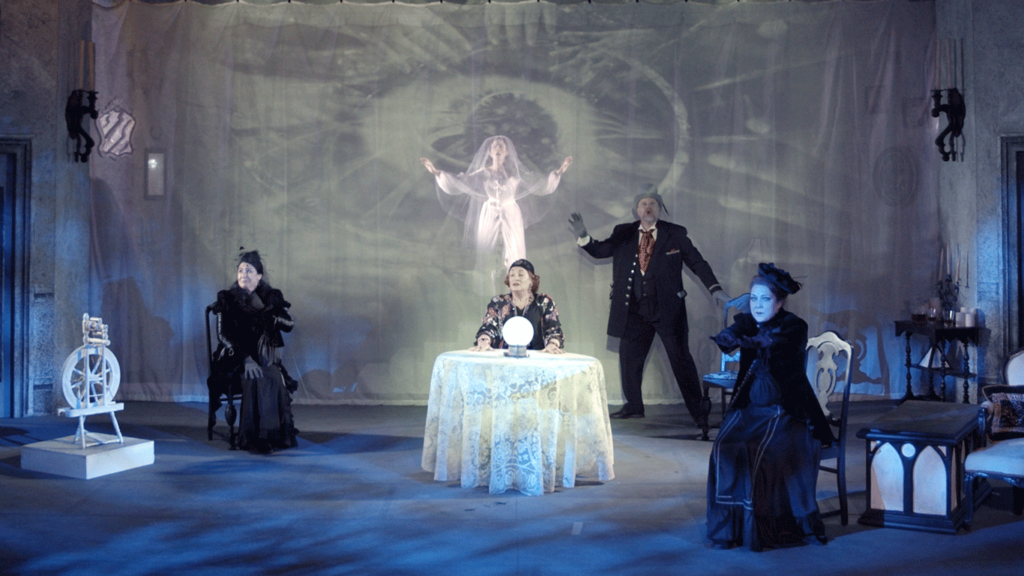
"OPERA OMAHA finished its mainstage season with a marvelous production of Mozart's Nozze di Figaro. This production is easily Opera Omaha's best production of the year. The ensemble's comedic timing was superb; one didn't want it to stop. The cast was filled with strong actors. Victoria Livengood's caricature of Marcellina was incredibly entertaining. After her first scene the audience relaxed and responded to the rest of the opera as if they were in their living rooms watching a movie, reacting to every little twist. To have that much control over the audience requires a true mastery of drama and comedic timing. Clearly, Livengood raised the bar for the rest of the cast, who stood their ground against this true tour de force." - Opera News Online, May 2023
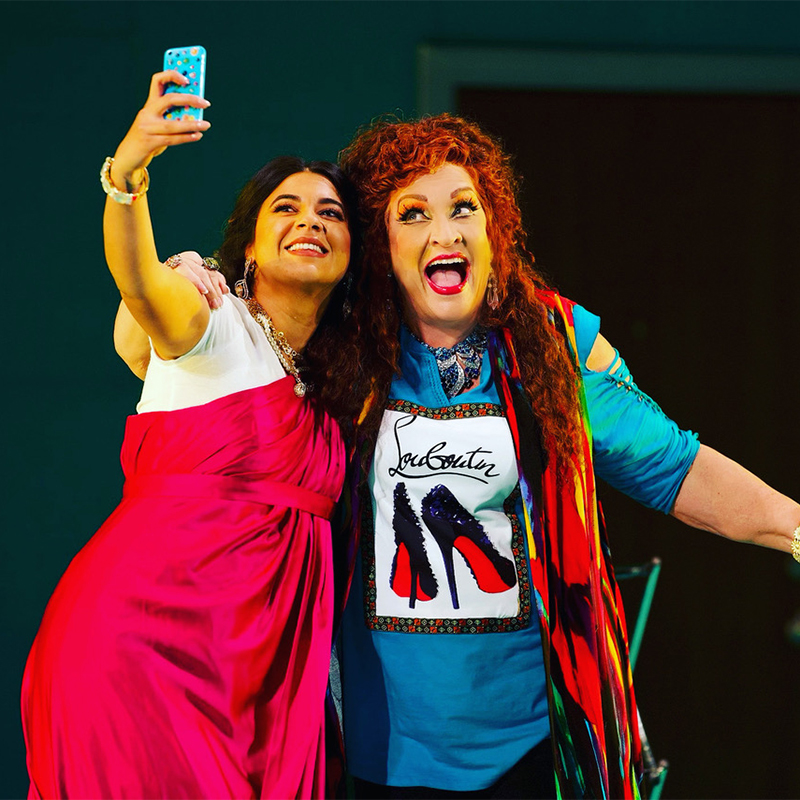
"The scene-stealing Victoria Livengood drew belly laughs as Marthe." - Freep.com
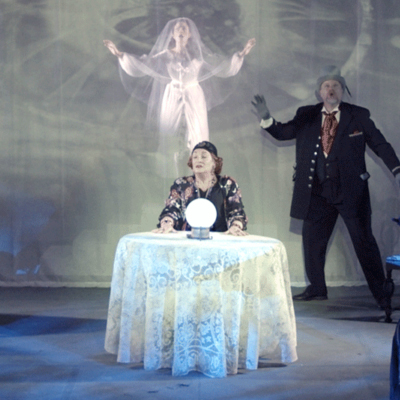
"Metropolitan Opera veteran mezzo-soprano Victoria Livengood is ideally cast as Madame Flora. With her carrot-orange hair and sensationally expressive face, Livengood, an outstanding singing actress, does not shy away from bringing out the ugly, abusive side of this battleaxe who finds relief in the bottle. One may not entirely sympathize with Livengood's Flora, but she makes clear she's a survivor who's fiercely searching for the truth. I'd love to see Livengood as Mrs. Begbick in Kurt Weill's The Rise and Fall of the City of Mahagonny." - Ambush Magazine
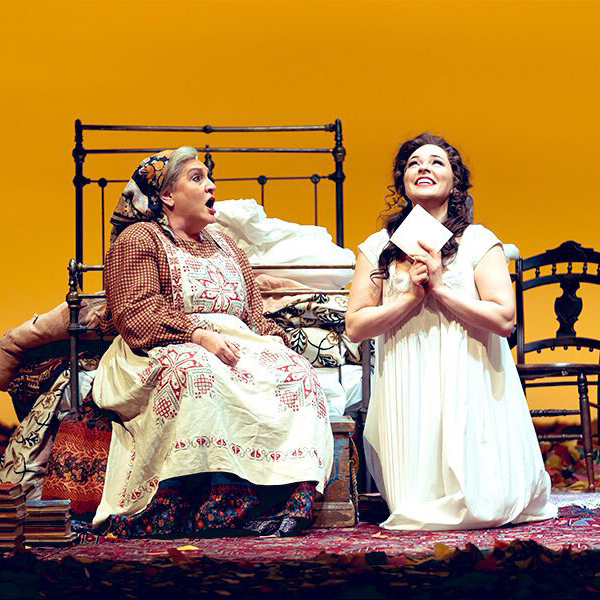
"Where the production excelled vocally was in its veterans. Victoria Livengood, the American mezzo, was fabulous as the old nurse." - The Washington Post
"Throughout the opera a series of secondary characters help to advance the story's themes of love. Mezzo-Soprano Victoria Livengood is Tatiana's nanny and confident, Filippyevna. The bond between her and Nechaeva radiates warmth, providing some of the opera's lighter moments." - BroadwayWorld.com
"Rounding out the cast, Victoria Livengood is the old nurse Filippyevna, and sings with texture and expression." - Metro Weekly
"The luxury casting extended down to the casting of the servant Filippyevna in Act 1. Mezzo soprano Victoria Livengood was outstanding." - Washington Classical Review
"The other singers achieve moments to round out the themes of regret, lost youth, and the bittersweet rise of melancholy looking back at the crossroads of life. Elena Zaremba, as Olga's and Tatiana's mother, and Victoria Livengood, as the girls' old nurse and companion to Madame Larina, set just the right feeling in the first scene as they prepare a harvest festival and swap stories of romantic urgings of their youth. Livengood's assured performance is delicious, and their effective physicality and vocal harmonizing of two women who have grown old together make for a compelling duet." - DC Theater Scene
"Victoria Livengood sang very well as the nanny Filippyevna." - Seen and Heard International
"Victoria Livengood stole every scene she was in, exuding wisdom and warmth, as Tatiana's nurse, Filippyevna. In fact, the short duet in which Tatiana dispatches Filippyevna to convey her just-written letter to Onegin seemed like the real Letter Scene." - Parterre Box
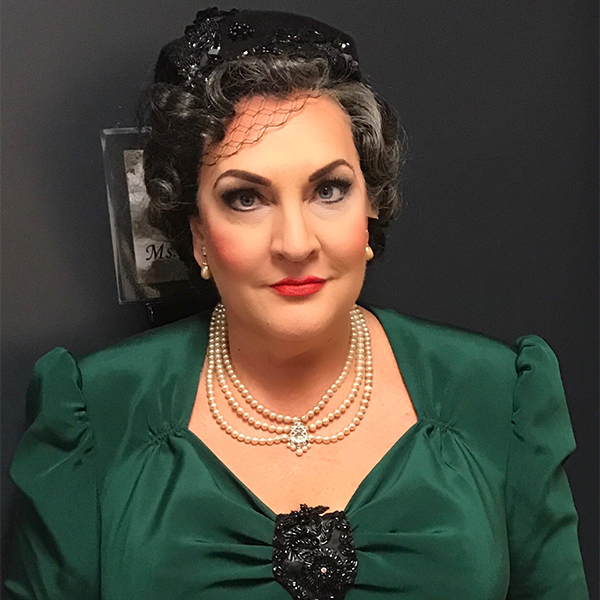
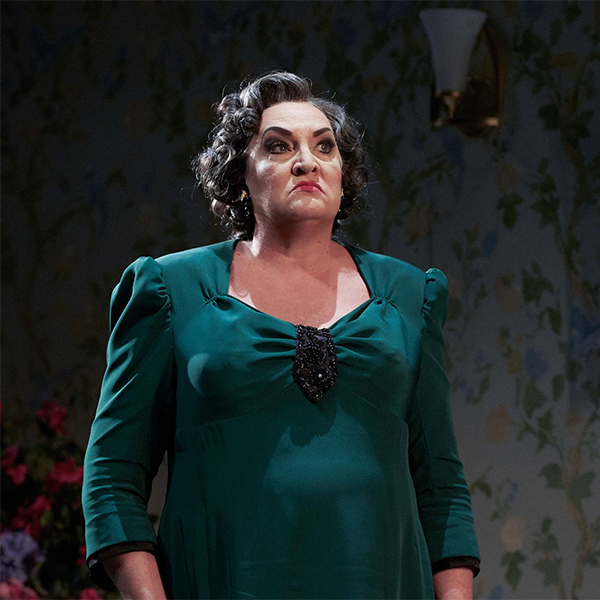
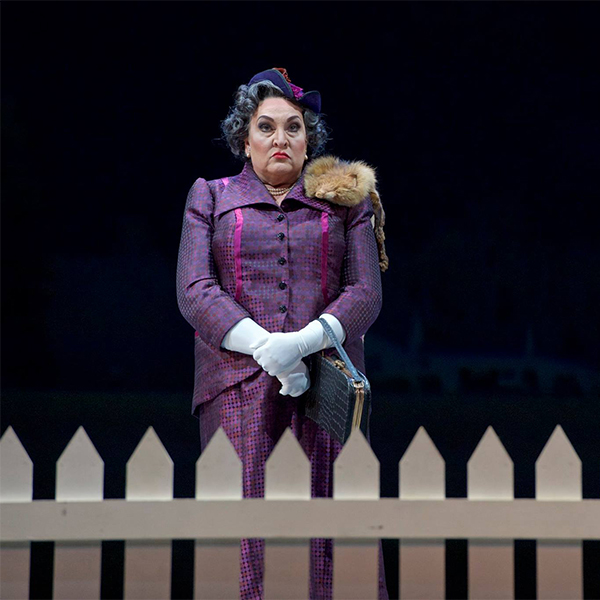
Victoria Livengood was a thoroughly chilling Kabanicha, a master of psychological manipulation who used her dusky low notes to embody the cold-as-dry-ice matriarch. - The Seattle Times
As Katya's cruel mother-in-law, Kabanicha, Victoria Livengood evokes the specter of Joan Crawford at her Mommie Dearest worst, from her hair to her posture to her ice-cold cruelty. The freezing menace in Livengood's voice gave me the chills. - Madison Park Times, WA
As Katya's domineering mother-in-law Kabanicha, Victoria Livengood's deep voice reinforced her nastiness. - The Seattle Post Intelingencer
All of the opera's characters are oppressed by the walking storm cloud that is Kabanicha, the mother-in-law; Victoria Livengood turns her into one of Seattle Opera's more memorable villains, all the more chilling because you probably know someone like her. - The Seattle Weekly
Perhaps the character formed by the mezzo Victoria Livengood (Kabanicha) is responsible for much of the success of the opera. Victoria Livengood was an applauded Kabachina. The American mezzo coined a hypnotic mother-in-law. It was impossible to stop following her evolutions on the stage which left in the air the disturbing atmosphere Janáček had wanted. - Opera World, Spain
This is an opera about women. Victoria Livengood, in the critical role of Kabanicha, was perfectly cast. Her voice has a slight vibrato coupled with a sharp edge that perfectly encapsulated the dangerous self-absorption of a relentless matriarch. - Seattle Gay News
Katya is silenced by her mother-in-law, a dyed-in-jewel-colored-wool villainess sung by Victoria Livengood, who pours every ounce of her strong mezzo and callous body language into her heartless character. She is a villain to reckon with, and Livengood relishes playing this part. - Oregon Artswatch
"From her Mama Rose-style entrance up the aisle, Victoria Livengood imbued Mme. Flora with her wonted theatrical energy. Her barrelhouse contralto suits the role's scary moments; but, admirably, she brought legato-based soft tone to quieter passages, furnishing welcome contrast. Livengood is a seasoned Menotti interpreter who worked with the composer on this opera and The Consul and has also appeared in Maria Golovin. Her phrasing of the disintegrating fraud's final soliloquy proved expertly judged. She made every syllable of the text crystal clear, like an old-style Broadway professional." - Opera News
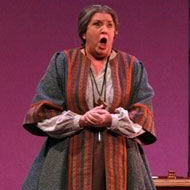
"But the main reason for the success of the evening was its principals and even the smaller roles were adeptly handled. Victoria Livengood's Filippevna was solid and steady." - Opera News, 2012
"The women in the cast were electrifying. Victoria Livengood showed phenomenal acting. She was perfect in all scenes, and the younger actresses had a bit of a hard time getting the focus of the attention back on them, since Ms. Livengood, a very seasoned performer, threatened to steal the scene every time she was on. Victoria Livengood was phenomenal! This veteran singer not only has a sensational stage presence as described above, but also has a booming voice that doesn't show signs of wear and tear beyond the age-appropriate stage. Boy, she is good!" - Opera Lively, March 18, 2012
"The cast was - in a word - spectacular. It's funny how, sometimes, artists who play comprimario parts can come to dominate the proceedings. This was often the case in Act I, wherein the singing and acting of the great Victoria Livengood, the Nurse, consistently drew attention (in invariably favorable ways, and never ostentatiously). Vocally she was resplendent, reminding senior listeners of her many great leading roles. Dramatically, she was "on" at every moment, whether singing or not, engaging actively with eye-contact and facial expression." - CVNC, Arts Journal of NC
"I was very pleasantly surprised with two other singers who were just as extraordinary in their roles. Victoria Livengood almost stole the show from her younger colleagues. Our dear "Dixie Diva" veteran, a North Carolina native with 80 roles in her repertory, who sang 120 performances at the Met and is still going (most recently seen there as the Fortuner Teller in Arabella), was simply excellent as Filippyevna, a role that is a lot more important in this opera than it seems. Victoria's voice has no wobble, and remains strong with great projection and diction (her Russian was arguably the best one on stage)." - Opera Lively
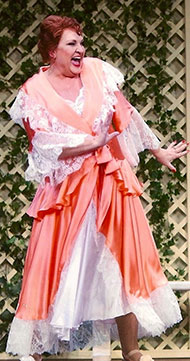
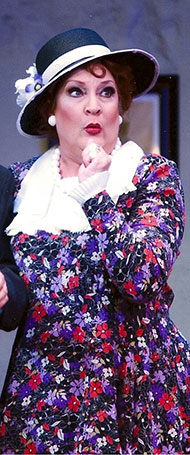
"Boston Lyric Opera's "The Inspector" is a comic opera that's actually funny, with a cast possessing solid vocal skills and dead-center comic timing! Special mention must be made, however, of mezzo-soprano Victoria Livengood, who nearly stole the show as the Mayor's Wife, the power-hungry matron whose notion of absolute power seemed to consist primarily of acquiring lots of hats and shoes." - Opera News
"On the other hand, the first act solo for Sarelda, in which she conjures visions of shoes, hats, and gowns, is suave, hilarious, and convincing. Boston Lyric has cast The Inspector with near perfection. Victoria Livengood as Seralda is a clear standout, with clarion top notes and a thrilling contralto." - Boston Classical Review
"The solo singing is excellent across the board, with mezzo-profundo Victoria Livengood running off with the show in the flashy comic role of Sarelda, the mayor's scheming, ambitious wife." - The Edge, Boston
"The cast is all but upstaged, however, by mezzo Victoria Livengood as her crass, calculating mama; Ms. Livengood is a world-class comic talent as well as a Met-level mezzo, and she expertly crosses Imelda Marcos with Carol Burnett to create an indelibly, almost brutally hilarious performance as, in her husband's words, "the shrewdest of shrews - who'd screw for new shoes." In fact, I'll call this one right now - there will be no one, and nothing, funnier than Ms. Livengood on a Boston stage this year. (And she's a terrific mezzo to boot.)" - The Hub Review, Boston Arts
"There are many laugh-out-loud moments, thanks to a terrifically funny libretto and great comic timing. As the Mayor's wife, Sarelda, Victoria Livengood was brilliant. Her aria about shoes was one of the evening's most memorable moments, evoking a character that was half Miss Piggy, half Imelda Marcos." - BachTrack Online"The cast was strong. Its top stars were bass-baritone Jake Gardner and mezzo Victoria Livengood, who had already amused us as a married couple, Doc and Mrs. Doc, in NY City Opera's A QUIET PLACE and here had more to sing and act as Mayor and wife. As always, Livengood held center stage with rich voice and riveting stage presence including plenty of movement. Her biggest moment was the "Shoes" aria, the only solo piece that drew applause (and it was intense). Her character Sarelda (Sarah Palin and Imelda Marcos) was dreaming of thousands of shoes, dresses, and hats - the high fashion she would wear when she ascended to status in Rome. But her costumes (by designer David O. Roberts) were already showy. As wife she was publicly fond and privately standoffish, as mother doting and imperious - a complete characterization." - Opera List Online
"Victoria Livengood as Sarelda, the Mayoress, sang with all the self-importance of a diva; she gave an exciting reading of the shoe song (more of a Broadway style than operatic)." - The Boston Musical Intelligencer
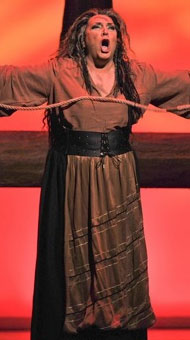
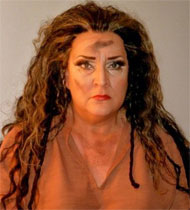
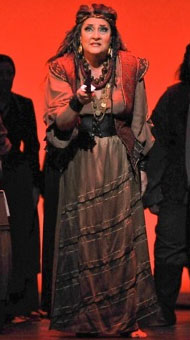
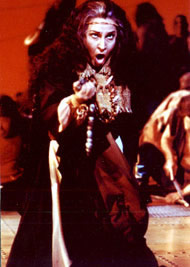
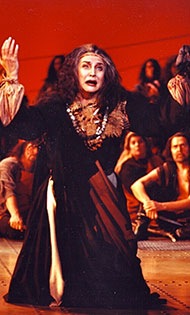
"This production put together impressive, hefty-voiced singers. As the crazed Azucena, mezzo-soprano Victoria Livengood had many memorable moments. Her voice seems to be three distinct insturments: a strong lower register of remarkable clarity; a smooth, flexible middle voice; and a bright trumpet of an upper range that cuts through chorus and orchestra with amazing force. Dramatically it was in the final prison scene, in which she sat trance-like, holding a crumpled blanket to her cheek, gently crooning to it as if her heart would break, that Livengood impressed the most." - Leonard Eureka, "Il Trovatore - The Voice" (Fort Worth Weekly)
"I had to keep pinching myself Saturday night, to make sure I was actually sitting in Bass Performance Hall and hearing the glorious sounds filling - and I do mean filling - the room. Enrico Caruso famously quipped that the only thing you need for a great Il Trovatore is four of the greatest singers in the world, and you'd be hard pressed to outdo the four Darren Woods has booked for the Fort Worth Opera Festival. This is one of the operatic thrillers of the year. Then there's Victoria Livengood capturing both the sheer weirdness and the maternal warmth of the gypsy Azucena, her potent mezzo including a fearsome chest voice. It's not just that the voices are thrilling per se, but that the singers deploy them so dramatically and expressively. They sing quietly and conspiratorially as well as ferociously and they bring Verdi's tragic figures vividly to life." - Scott Cantrell, Classical Music Critic (Dallas News, May 22, 2011)
"The Fort Worth Opera gave a powerful demonstration on Saturday night of why Il Trovatore has remained one of the most popular operas down through the years. Verdi's Gothic horror story has lost some of its punch through familiarity, but with the right ingredients -- especially four topnotch singers in the leading roles -- it can send a shiver down the spine once more. The Fort Worth Opera has those ingredients and mixed them well on Saturday night. The Fearsome Four included alto Victoria Livengood as Azucena, who sang her taxing role with strength and ear-pleasing vocalism and her acting was Verdi-capable." - Olin Chism (Fort Worth Star Telegram, May 22, 2011)
"The real star of this production, however, is the simply awe-inspiring Victoria Livengood in her role as Azucena. I probably could have done the entire review singing her praises. Having recently heard Dolora Zajick give a rousing performance of the role for the Metropolitan Opera, I was incredibly surprised to hear a mezzo-soprano top that performance so soon, and in Fort Worth. The role of Azucena is one that requires the singer to bring out their inner-crazy. It is by no means a dainty, femme-fatale character, because in the end, everyone is simply acting according to Azucena's plan. Ms. Livengood brings out the role like I've never heard. Her ability to utilize her chest-voice and bring out her extended lower range sends the character over the top. The audience almost gets the sensation that two women are singing. The "earthy" quality of the sound not only invokes fear and mystery, it demonstrates the true power of the character. It allows the audience to see the two sides of Azucena - the one telling Manrico she loves him, and the one plotting the continued pain of the Di Luna family. Everytime Ms. Livengood took the stage, you could feel the excitement level rise in the hall. I'm still shouting "Brava!" today." - David Weuste (Everyday Opera, May 23, 2011)
"The women rule the night, as the performance given by Victoria Livengood as Azucena is brilliant. While the role does not have as wide a vocal range as that of Leonora, it makes up for it in stamina - and Livengood has that in spades. In addition to having a magnificent voice, she is easily the best actor of the evening. A remarkable moment for her is in the second act when she recounts the story of her mother's death to the rest of the gypsies; as part of the staging, she is seen to be physically drawing in the crowd. Her control often has the same effect on the audience: everyone seems physically drawn in whenever she sings. Do not miss this production. The vocal fireworks alone make the price of admission worth it. You will not leave disappointed." - John Norine Jr. (Theater Jones.com, May 22, 2011)
"Fans of great singing who make the drive over to Fort Worth can experience a steady flow of wonderful vocal performances, presented with a level of devotion that imbues Verdi's sometimes twisted plot with momentum and credibility. This dream cast includes Mezzo-soprano Victoria Livengood. She owns a dusky, auditorium-filling voice and emphasized the crazed, post-traumatic delusional aspects of the character of Azucena, the old gypsy woman. - Dallas Front Row Critic
"A fine cast of established, first-rate singers has been assembled, and they do a good job of selling this uncompromising creation. Victoria Livengood, as Azucena, is the stuff bad dreams are made of - in other words, PERFECT! She rules the stage, not only with her haunting, resonant voice, but with her intensity." - Buffalo News (June 25, 2011)
Other Performances
"Best of the cast was mezzo-soprano Victoria Livengood as Azucena. Her voice was a size larger than anyone else's, yet only she came close to a clean trill. Her singing and acting radiated intensity. She riveted attention before singing a note, even through the clanging anvils." Opera News
"I do not remember hearing such an enormous voice in the Discovery Theatre as that of Victoria Livengood. Also having the most impressive resume among the cast, she demonstrated the above mentioned abundance of vocality when her voice topped not only the orchestra but the entire men's chorus that was backing her up. Ms. Livengood is a genuine, natural, fully-qualified Verdian, her pitches accurate, phrasing comfortable yet dramatic. She maintained a high level of energy in one grueling scene after another while amply filling the house to the back-row seats." Anchorage Daily News, Alaska
"As the distraught and avenging gypsy-witch, mezzo-soprano Victoria Livengood, plays her role with relentless intensity, keeping her huge, grief-crazed eyes thrust on the audience. With the stage designed to hang partially over the orchestra pit, Livengood brought this already dramatic production to a high pitch." The Columbian, Oregon
"Livengood's Azucena - all twitching, tortured anguish - lived up to one of her lines in the opera: "It still raises my hair to think about it." Livengood is a first-rate singing actress; disarming naturalness of gesture, unexpected shading of phrasing, and something scarily raw in her horror at the murder of her own heart made for a mesmerizing performance." Willamette Weekly, Oregon
Reviews |
|||||||||||
|
|||||||||||
|
|||||||||||
|
|||||||||||
|
|||||||||||
|
|||||||||||
|
|||||||||||
|
|||||||||||
|
|||||||||||
|
|||||||||||
|
|||||||||||
|
|||||||||||
|
|||||||||||
|
|||||||||||
|
|||||||||||
|
|||||||||||
|
|||||||||||
|
|||||||||||
|
|||||||||||
|
|||||||||||
|
|||||||||||
|
|||||||||||
|
|||||||||||
|
|||||||||||
|